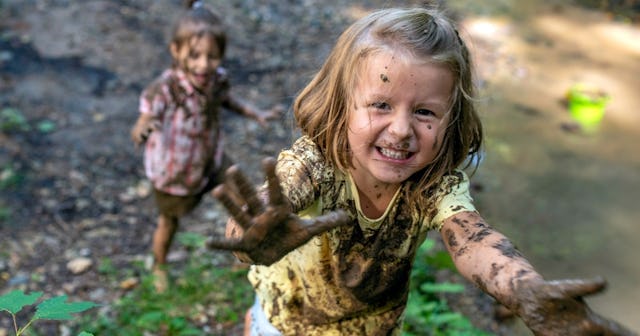Getting Dirty May Help Ward Off Anxiety

My sons like to dig holes. They generally go outside in the middle of the afternoon and commence work on the pit they’ve constructed in our backyard, which has become, at various times, a dinosaur swamp, Roman aqueducts, dams, and, well, an enormous hole. They also crawl around in the dirt looking for lizards, salamanders, frogs, and other forms of creepy-crawlies.
I always knew getting dirty was good for them, but now I have one more reason to encourage it. The tendency towards anxiety runs in our family. And according to a study done at the University of Colorado-Boulder, a fatty acid interacts with a bacterium found in the soil. This interaction helps decrease inflammation — and “increases resilience to stress,” says an article in Neuroscience News.
This could, they say, bring us closer to a stress vaccine. Imagine a vaccine that would decrease stress and ward off anxiety. Imagine how much that would help the 40 million adults, or 18.1% of the American adult population, according to the Anxiety and Depression Association of America, who have anxiety. And that’s just the number of people per year.
Anxiety is the most common mental illness out there. Anxiety disorders, they say, also affect an incredible 25.1% of children. That’s not to say dirt would be some magic bullet. But even alleviating some of that anxiety would be a godsend to those of us who struggle with it every single day.
How Getting Dirty Helps
It works like this. In 1989, British scientist David Strachan came up with what is called the “hygiene hypothesis”: basically, we’re too damn clean. Kids who spend more time outside getting dirty have better health outcomes than children who grow up in a “modern, sterile world,” says Neuroscience News, “leading to impaired immune systems and higher rates of allergies and asthma.”
So they thought that dirt helped — somehow. But they didn’t quite know how.
Then they refined it — it wasn’t just getting dirty, or some kind of exposure to magic germs in the dirt. We were getting less exposure to happy microorganisms that tamped down “inappropriate inflammation.”
“That has put us at higher risk for inflammatory disease and stress-related psychiatric disorders,” said senior author of the study and Integrative Physiology Professor Christopher Lowry.
Neuroscience News says the more we moved into cities and away from our dirty farms, our agricultural roots, and our hunter-gatherer lifestyles, the sicker we were becoming — not only with allergies, but with psychiatric disorders as well. We are becoming bundles of nerves stuck together with allergies and asthma, all bound together by “inappropriate inflammation.” Ouch. And all that sterilization of all the things, all the anti-microbacterial stuff — that can’t help us very much, either. We’re obsessed with sterilizing everything from pacis to doorknobs.
When’s the last time you heard someone chant, “God made the dirt and dirt don’t hurt?”
What about the 5-second rule? Do you even know what the 5-second rule is? If you do, and you implement it, sounds like some scientists might be applauding you (as long as you’re not dropping that stuff onto raw chicken).
What The Studies Say
According to Neuroscience News, the lead author of this study has spent a lot of his time researching what getting dirty does to people.
One of his studies examined the differences between kids raised in rural environments, surrounded by animals (dirty) and “bacteria-laden dust” (dirty). Those kids grew up to have “more stress-resilient immune systems and may be at lower risk of mental illness than pet-free city dwellers.” Several other studies showed that when the Mycobacterium vaccae bacteria “is injected into rodents, it alters the animals’ behavior in a way similar to that of antidepressants and has long-lasting anti-inflammatory effects on the brain.”
Basically, when you get the mice dirty, they get happy. Dirty mice equal happy mice.
But this new study took things a step further. It first identified a key fat, or lipid, in the bacteria. Next, they synthesized it in a lab and they looked at how it interacted with immune cells. The cells that were treated with the lipid were more resistant to inflammation. To us laypeople, this doesn’t sound like a big deal. But remember: inappropriate inflammation causes things like asthma, allergies, and mental illness.
So when the cells get dirty, they’re better at keeping us physically — and mentally — healthy.
What This Means
Why has Dr. Lowry been so obsessed with getting dirty? Neuroscience News says he wants to develop “a stress vaccine from M. vaccae,” the good bacteria we’ve been talking about, “which could be given to first responders, soldiers and others in high-stress jobs to help them fend off the psychological damage of stress.” Just knowing how this bacteria works is a huge step in that direction. If more studies show that fat itself, not even with the bacteria, has benefits, we could just use that, rather than the whole bacteria, “as a target for drug development.”
In the future, this could mean an actual stress vaccine.
In the meantime, go get dirty and tell your kids to get dirty. Stat.
This article was originally published on